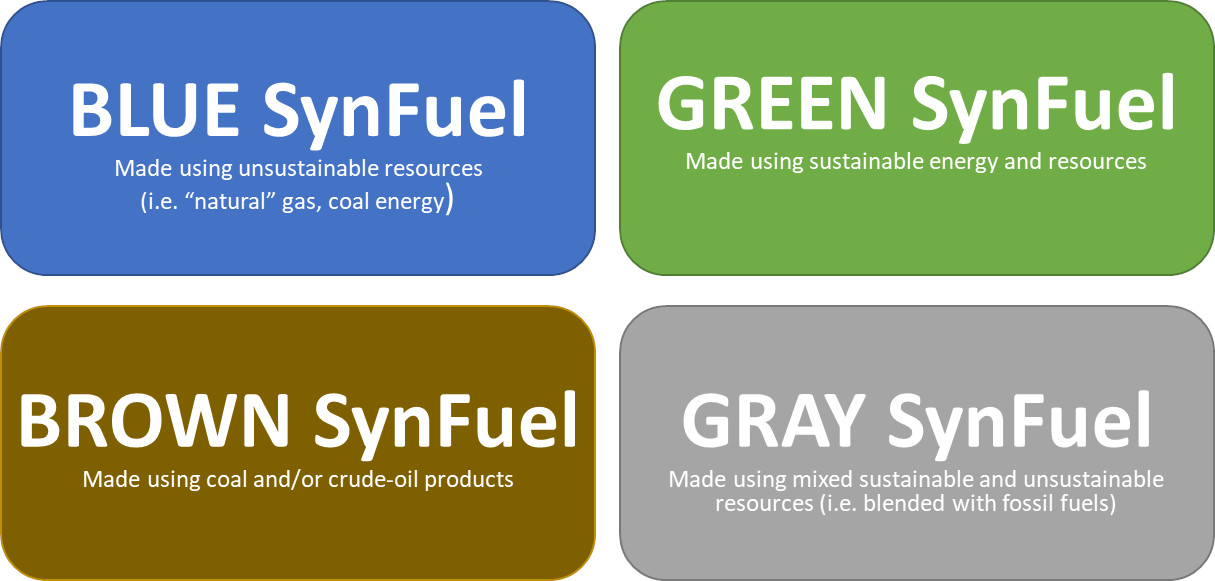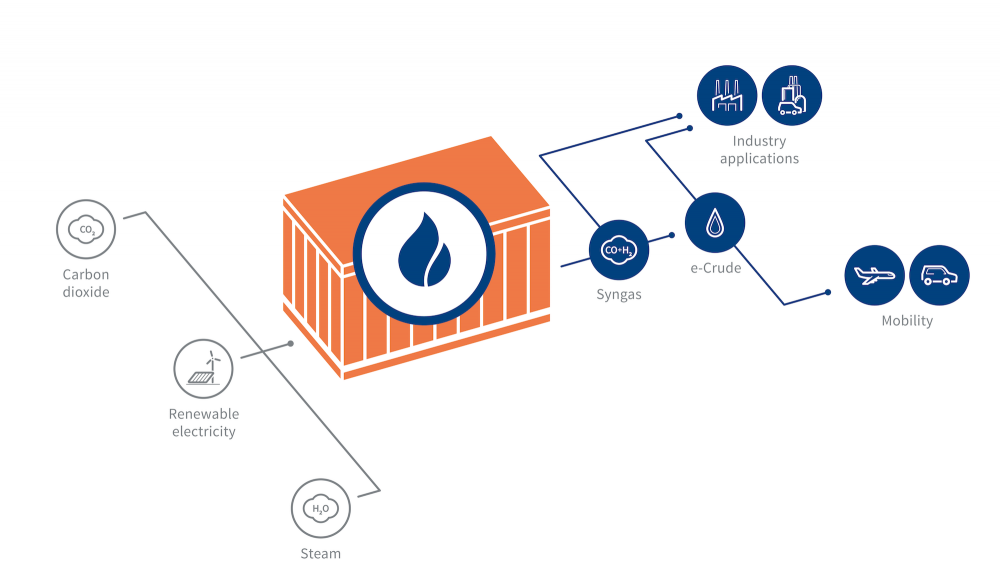… and the Question about System Relevant Jobs
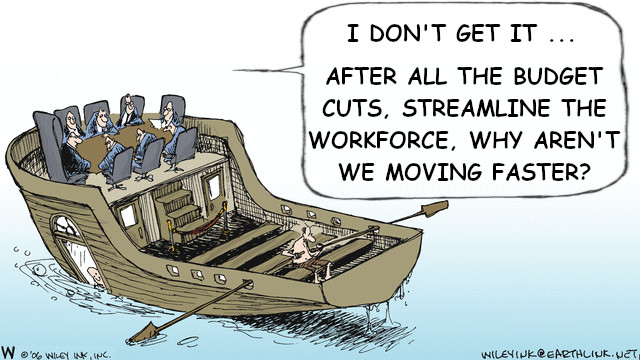
Today I had a very emotional discussion about the need for new IT, new processes and all that other stuff the consulting industry keeps telling us, we got to have. Consultants, that have a standing relation inside the aviation company, with constant projects to “improve” and streamline the work.
At what cost?
Having addressed Consulting, Outsourcing, Cloud? COTS or tailormade back in August 2020, we meanwhile discussed over and again the issue of “System Relevant Jobs”. Back in my economics studies, 40 years ago, the general manager of my intern company questioned the increasing “management jobs” by academics, reminding, emphasizing that in the end, it is all about products. Even in whole sale (it was a central logistics warehouse) it’d be a question about benefit for seller and buyer, where the warehouse we worked in distributed the goods to the own satellite stores. He warned, that every intermediary becomes a leech and products becoming more expensive, not cheaper, by adding more and more intermediaries into the pool. His assumption was that 50% management surplus would be viable. And I should mention that he warned about dependencies from “rogue countries”, like China. Cheap but at what cost?
Being very pro globalization in general, he did call it hypocrisy to buy cheap in China, knowing that this is simply based on abuse of work force and stealing of patents and other ideas from other countries – back in the days, China did not much invent themselves, they were known copycats. In Germany meanwhile called “precarious jobs”, that don’t provide decent living, the living standards of workers in China at the time were at best questionable.
System Relevant Jobs
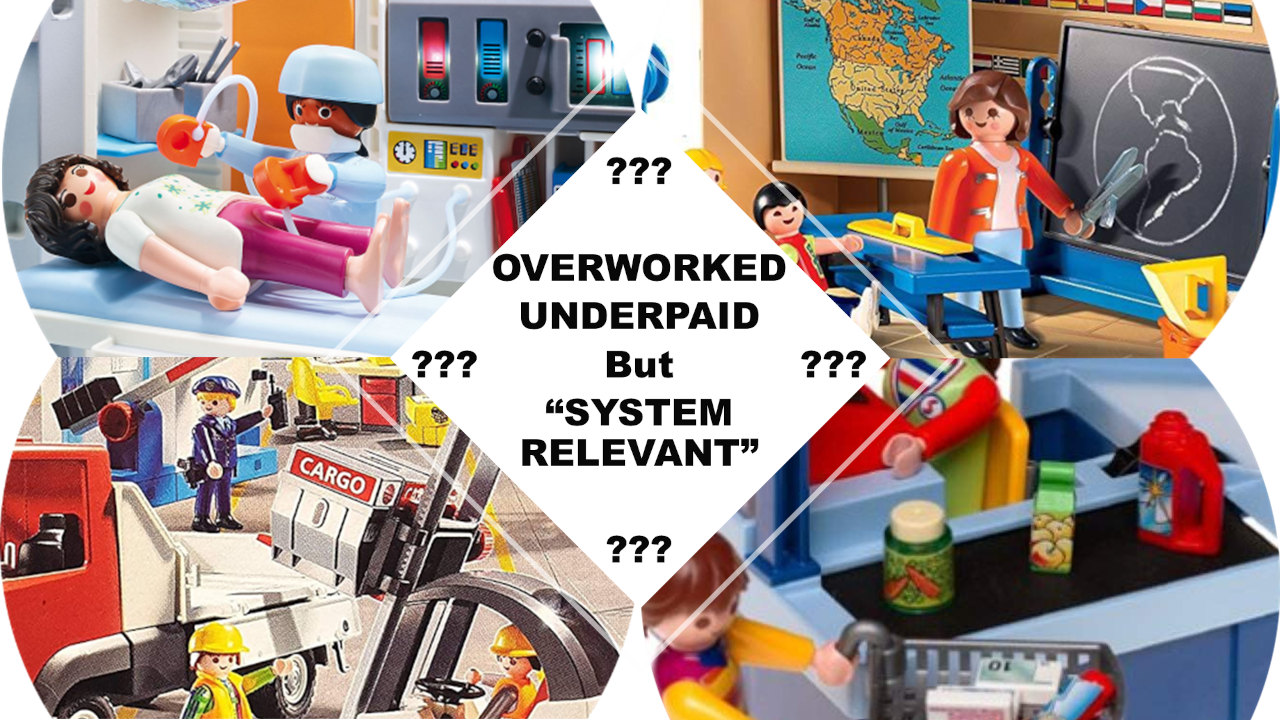 Is your job “system relevant”? If you work in home office, I can tell you the answer is No. If you work in consulting, I can very likely tell you the answer being No. Working in aviation and transport, the answer very likely is No. And if your salary is above average, the answer also very likely is No.
Is your job “system relevant”? If you work in home office, I can tell you the answer is No. If you work in consulting, I can very likely tell you the answer being No. Working in aviation and transport, the answer very likely is No. And if your salary is above average, the answer also very likely is No.
It’s all about leeches. Draining the money out of the really system relevant people, who normally are overworked, but underpaid. Not on the picture are farmers, friends of the family farming, living since I grew up on the brink of bankruptcies over and again. With more and more demands and pay for their products (milk, meat, grain, etc.) being often below the cost of production. Then they get generously state aid, to keep them working on subsistence levels.
The NHS personnel is on strike, the medical situation there in the U.K., also in Germany, being devastating. 24 hour shifts, 3 days “on call” duty?
Logistics drivers, the one delivering all those fancy goods we all buy, paid at minimum wage or just very little above for good feeling? Uber being a gigacorn? Delivery “Heroes”? But the managers in their offices having a “decent salary”? Who’s doing the work and what do we pay them?
U.N. Sustainable Development Goals

There are 17 SDGs. But all statistics show that all of them are actually still deteriorating. And if companies call themselves “sustainable”, they usually focus on the easy SDGs, most times at the cost of the others. Yes, we invest into climate, we buy CO2-certificates. And buy our growing hunger for power from the grid. Sure we buy “green power”… We upgrade our HR Director to “Chief HR Officer” and call it a board position, but only on paper to look good. We invest in R&D to find solutions how we can become sustainable in the future, while we fight the unions and deny salary increases for our workers. We add the (female) position of Chief Sustainability Officer to express our commitment to the SDGs. Oops, we forgot to give her a budget or empower her responsibilities? Examples aplenty…
We need companies to do the right thing. To embrace sustainability and evolve. It’d give them a competitive edge, a USP. When I was a child, it was common that people worked for “Daimler” (Mercedes-Benz) or “Bosch” all their live. You looked after your stuff from post-school training to retirement – often even beyond. Then they became “Human Resources” to managers who turned “shareholder value” from “what’s good for the company” and “long-term thinking” into “what’s good for my bonus” and “who cares about the time after I’m gone”.
A Question of Respect
 My “intern” boss (again) taught me respect for everyone. The guy on the fork-lift, the cleaners, truck drivers and “secretaries” (yeah, we still had those). He taught us to set up the coffee when it was empty and not bother the secretaries. To clean up ourselves to make the cleaners’ jobs easier. To think beyond our petty box as “office workers” and value the hard work of the real workers. Also to question, but then also embrace the value of our work. IF we added value.
My “intern” boss (again) taught me respect for everyone. The guy on the fork-lift, the cleaners, truck drivers and “secretaries” (yeah, we still had those). He taught us to set up the coffee when it was empty and not bother the secretaries. To clean up ourselves to make the cleaners’ jobs easier. To think beyond our petty box as “office workers” and value the hard work of the real workers. Also to question, but then also embrace the value of our work. IF we added value.
And in the pandemic, we should have (but obviously didn’t) learn the other lesson. That it’s not enough to sit at the windows “applauding” the system relevant workers that went above and beyond any perceivable “line of duty”, but to pay them decently. To look after them and keep in mind that they also have families to sustain, vacation wishes that go beyond the balcony on an old residential block they only can afford with added state aid.
Beyond White- and Greenwashing
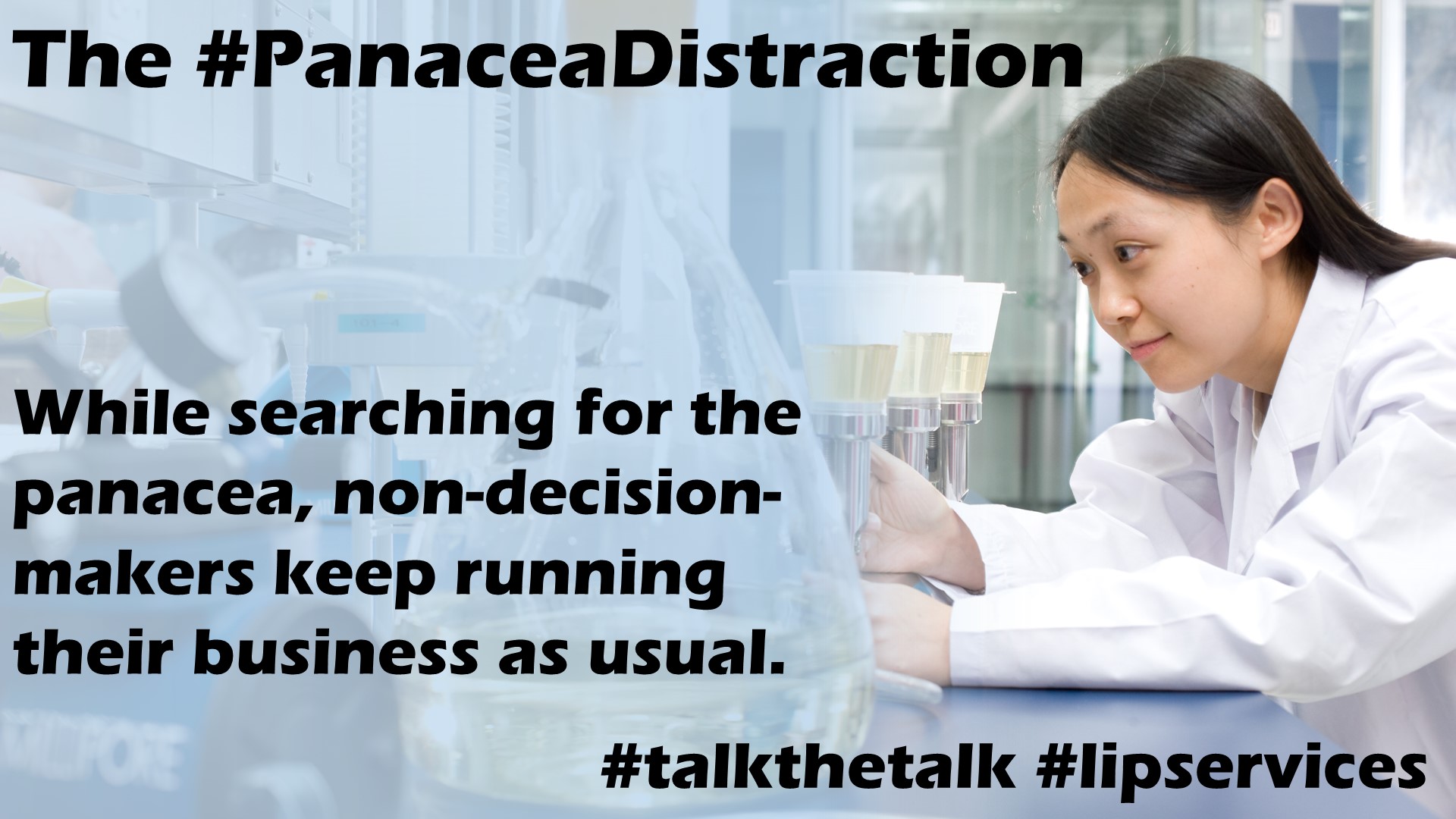 I recently attended a multi-week project by United Nations Climate Action on Circular Economy. And the need for lifecycle-assessment. But it was also mostly #talkthetalk and academic ideas. And I had several objectives that then led to my image about the panacea distraction.
I recently attended a multi-week project by United Nations Climate Action on Circular Economy. And the need for lifecycle-assessment. But it was also mostly #talkthetalk and academic ideas. And I had several objectives that then led to my image about the panacea distraction.
Aside me wondering, of that lady in the image might be an unpaid intern? Another reflection of the value HR managers and their bosses have about the value of training and labor. Any employer not paying their interns should be put in the pillory. For labor abuse!
Oh yes, and that goes in line with midwifes that quit their jobs as governments don’t reduce but add to the legal strains in the job. Or riders asked to bring their own bikes – and repair, all at minimum wage and abusive “time management”. Or airlines outsourcing their pilots forcing them into bogus self-employment without vacation or sick-leave cover, paid wages below their own pilots. Back in my intern-days, there were “personnel agencies” too. But to hire someone for short-term was always about 50% higher cost than employing someone directly. What went wrong there?
Yes I could go on.
Food for Thought
Comments welcome!
Yes. Comments welcome: Do you agree, disagree, partially, am I right, wrong, do I oversee anything? Have your own examples? What would, could and should we do?
